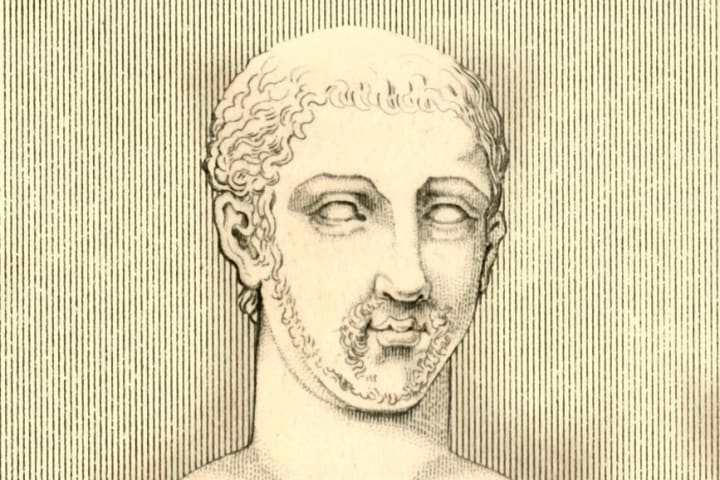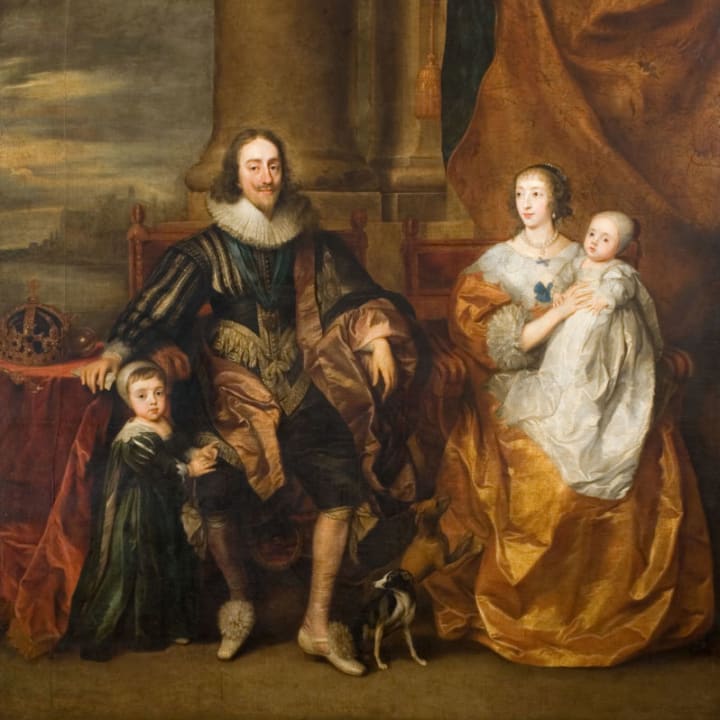Did you have an English teacher who read way too much into what a poem really meant? That teacher has nothing on fans of the Roman poet Virgil (also spelled Vergil): They believed his poetry could be used to predict everything from the outcomes of battles to who would be king. It was all there—if you knew how to look for it.
Virgil was one of the pet poets of Augustus, the first emperor of Rome. Virgil’s early poems (collected together as the Eclogues and the Georgics) sing the praises of the simple life of farmers and the joys of the countryside. Augustus encouraged Virgil to try his hand at something greater. While the Greeks had grand national epics in The Iliad and The Odyssey, the Romans had nothing in their cultural world that could compare. Virgil was tasked with writing the story of Rome’s rise to glory.
The Aeneid is the poem that Virgil created. It traces the journey of Aeneas from his escape from Troy to his arrival in Italy where Rome would one day flourish. It also predicts that there will one day arise a glorious leader, one suspiciously similar to Augustus, who would save Rome from all its troubles. No wonder the emperor loved it.
Published after Virgil’s death, The Aeneid became one of the cultural touchstones of the Romans. With nearly 10,000 lines of gorgeous poetry to pick from, whenever a person needed a literary quote they could always turn to The Aeneid (though when it began to be used as a method of prediction is a matter of scholarly debate).
That some thought Virgil’s work was prophetic sounds more unusual to modern ears than it actually was. In fact, the use of texts to make predictions was practiced long before Virgil: From papyri discovered in the sands of Egypt, we know that quotations from Homer’s epics, The Iliad and The Odyssey, were used by oracles to glimpse the future; the Romans had diviners called sortilegi who used the choosing of lots (known as cleromancy/sortilege) to make predictions. Later, the use of tablets and scraps of papyrus with quotations were abandoned as predictive devices when books became more common, kicking off the practice of bibliomancy (literally, “divination by way of books”).
Here’s how it worked in its most basic form: When a person found themselves in a quandary, they would simply pick up a book—for our purposes, a copy of Virgil’s Aeneid—and let it fall open to a random page; then, they would pick the first line that caught their eye. This line, it was thought, would give them an insight into what the future held.
Known as sortes Virgilianae, this method of predicting the future has been used by emperors and kings throughout the ages (and today, anyone can try it online by visiting here). Here are seven people who put Virgil’s predictive power to the test.
Portrait Head of Emperor Hadrian / Heritage Images/GettyImages
Hadrian became emperor of Rome in 117 CE, but this outcome had not been guaranteed: He was first cousin (once removed) to the emperor Trajan, and other relations or powerful people could have been chosen to take the imperial throne after Trajan’s death. According to Hadrian’s biography in the notoriously unreliable Augustan Histories, he worried about Trajan’s opinion of him, so he tried the sortes Virgilianae (the first recorded instance of this method of divination) to see what the fates had in store. This is what it told him:
“But who is yonder man, by olive wreath Distinguished, who the sacred vessel bears? I see a hoary head and beard. Behold The Roman King whose laws shall stablish Rome Anew, from tiny Cures’ humble land Called to a mighty realm. Then shall arise.”
Indeed, Hadrian did sport a beard (he was supposedly the first Roman emperor with a full beard), and he did become emperor of Rome … possibly because Trajan’s wife, Pompeia Plotina, forged Trajan’s will to decree that Hadrian become the emperor.

Severus Alexander / Print Collector/GettyImages
According to the biography of Severus Alexander, emperor from 222-235 CE, Virgil was twice used to predict the emperor’s future. The first occurred when the future emperor asked a famous oracle about his future; the oracle issued a warning on the dangers of defying fate in the form of a verse from The Aeneid.
The second came when Severus Alexander was on the verge of inheriting the throne. His mother encouraged him to give up the pursuit of arts and philosophy and instead turn to martial pursuits that would be of more use to an emperor. The sortes Virgilianae seemed to confirm this was a wise choice: Severus Alexander chose a portion of The Aeneid that tells of how others may be more skillful sculptors or cleverer lawyers, but counsels, “Thou, O Roman, remember to rule all the nations with power.”
Though Severus Alexander was only 13 when he became emperor, he did fairly well in the post—at least until he was assassinated at 26 (along with his mother). That had apparently not been predicted by The Aeneid.
Claudius II, who became emperor in 268 CE, seems to have been almost addicted to consulting The Aeneid for glimpses of the future, which might be understandable given the fragile nature of the Roman empire when he came to power. At the time, the Roman world was divided into three warring sections—the Roman center; a Gallic empire; and the Palmyrene empire ruled by Queen Zenobia—and Germanic tribes threatened the borders.
The first time Claudius consulted the sortes Virgilianae, he asked how long his reign would last; he was answered with “Three times only shall summer behold him a ruler in Latium.” He might have been comforted by the answer he received when he asked how long his descendants would rule: “Neither a goal nor a limit of time will I set for their power.”
That might have been taken to mean they would enjoy rule without end, but prophecies can be fickle. Ultimately, Claudius II didn’t even get the three years promised by the sortes Virgilianae—he died after just two years on the throne. His family didn’t retain its hold on the empire for long, either …
Following the death of Claudius II, his brother, Quintillus, became emperor. Claudius had clearly foreseen this possibility, as he consulted the sortes Virgilianae about what would happen if he made Quintillus his successor. The response was, “Him shall Fate but display to the earth.”
This less-than-promising prophesy came very quickly. Some sources say Quintillus met his end after just 17 days, others slightly longer. But whether it was death by suicide, a mutiny by his troops, or defeat in battle (as various sources say), Quintillus did end up under the earth.

François Rabelais / Print Collector/GettyImages
The 16th-century French writer François Rabelais collected all the examples of the sortes Virgilianae that he could find from antiquity—and he also reported a time he tried it out for himself.
Rabelais entered a Franciscan monastery to gain an education. He and a fellow monk found the conditions to be overly harsh, even for a strict religious order, and they considered running away. So when they opened a copy of The Aeneid and chanced on the line, “Ah! Flee the cruel land, flee the greedy shore!,” the pair did not need much convincing and escaped. Rabelais would later put the sortes Virgilianae into his most famous work, Gargantua and Pantagruel.
Rabelais eventually left the Franciscan order altogether, but probably not on the prompting of Virgil. The Franciscans banned the study of Ancient Greek because it was thought to lead to heresy, and Rabelais—a keen scholar of Greek—got permission to transfer to the Benedictines, who were more amenable to his interests.
It may seem strange for Christians to turn to a pagan text for revelations, but some scholars thought Virgil had the gift of prophecy. In the fourth of his Eclogue poems, Virgil seems to predict that a boy will be born who will become divine and then rule over the entire world—which they chose to believe was a reference to Jesus written before he was born.

Portrait Of Charles I And His Family / Heritage Images/GettyImages
Charles I, king of England from 1625 to 1649, was never meant to be the ruler—he became heir only after the death of his older brother. Still, he had a strong belief in the divine right of kings and that he had been chosen by God to rule. But he suffered many unfortunate events in his life: His attempt to marry a Spanish princess as a prince was a fiasco, and unsuccessful raids on Spanish treasure ships after he became king were an embarrassing disaster.
And then he had his head chopped off after a bloody civil war.
According to one account, Charles was in Oxford in the early 1640s and, while exploring the library there, came across a copy of The Aeneid. One of his companions suggested that they try the sortes Virgilianae. When the ever-unfortunate Charles picked a verse, he came up with a curse delivered by Queen Dido:
“… harassed in war by the arms of a fearless nation, expelled from his territory and torn from Iulus’ embrace, let him plead for aid and see his friends cruelly slaughtered! Nor yet, when he has submitted to the terms of an unjust peace, may he enjoy his kingship or the life he longs for, but perish before his time and lie unburied on a lonely strand!”
The friend who was with Charles tried to calm him and show that the prophesy was false by trying the sortes too. He is said to have picked a verse that predicted his own untimely death, which also came true. Be careful before you go casually flipping through The Aeneid.
Use of the sortes Virgilianae isn’t limited to the distant past. Before he was a famous classicist, Bernard Knox—who had studied classics at Cambridge—fought in the Spanish Civil War and in World War II. While he was fighting in Italy, he came across a copy of Virgil in a bomb-damaged villa. “I remembered the sortes Virgilianae,” he later recounted. “I closed my eyes, opened the book at random and put my finger on the page. What I got was not so much a prophecy about my own future as a prophecy for Italy; it was from lines at the end of the first Georgic.” The passage read:
“ … a world in ruins … For right and wrong change places, So many wars, so many shapes of crime, Confront us; no due honor attends the plow. The fields, bereft of tellers, are all unkempt … … Throughout the world Impious War is raging.”
“‘A world in ruins.’ It was an exact description of the Italy we were fighting in,” Knox said. “I remember thinking: ‘If I get out of this alive, I’ll go back to the classics, and Virgil especially.’ And I did.”
Related Tags
Adblock test (Why?)


